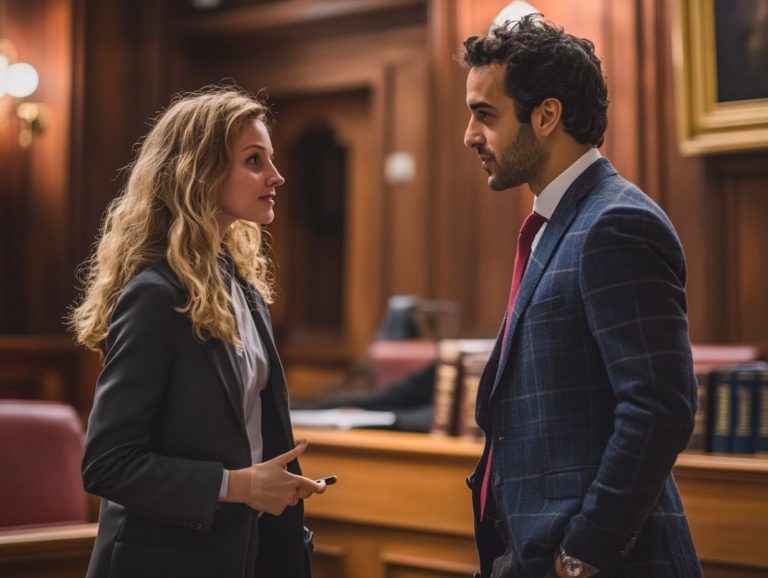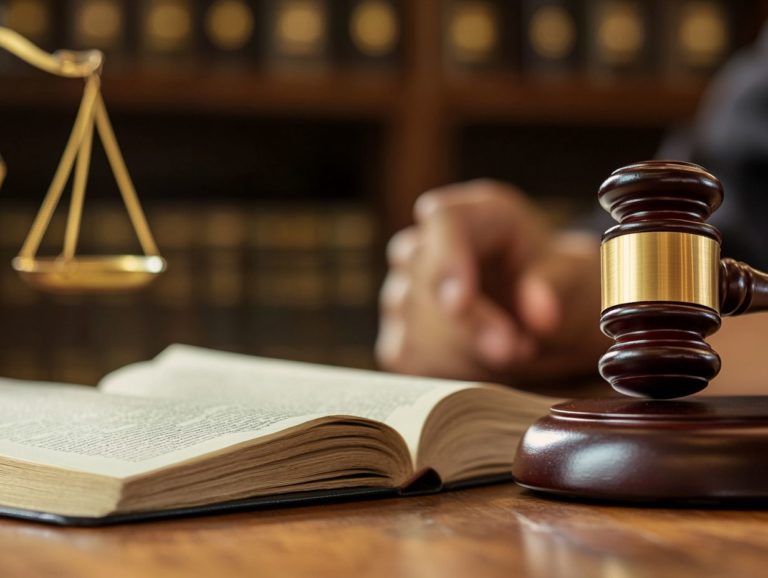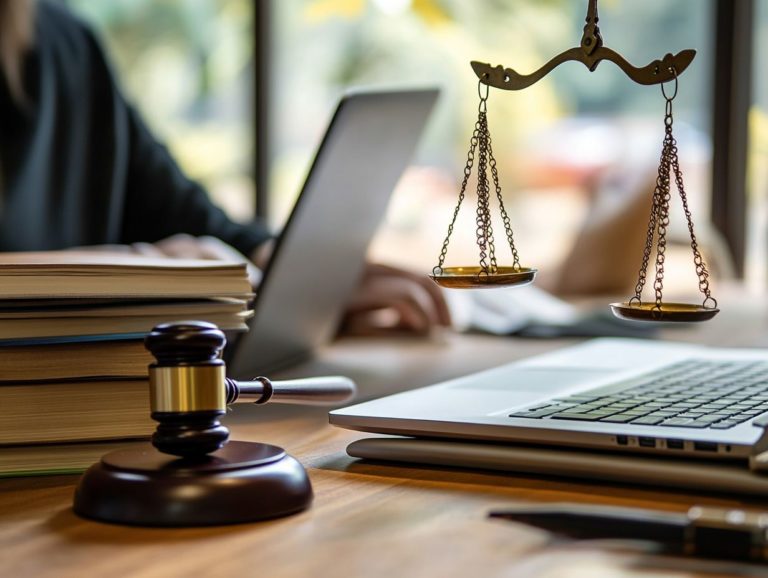5 Things You Should Never Say to Your Lawyer
Navigating the legal landscape can feel overwhelming, particularly when it comes to communicating effectively with your attorney. What you express can profoundly influence your case, so it’s crucial to approach each conversation thoughtfully.
This article delves into five phrases you should steer clear of when speaking to your lawyer while shedding light on how to cultivate a robust attorney-client relationship. It examines the potential pitfalls of miscommunication and provides guidance on selecting the right legal partner for your needs.
Whether you re confronting a legal challenge or simply seeking advice, understanding these dynamics is vital to achieving a successful outcome.
Contents
- Key Takeaways:
- 1. “I Didn’t Do It”
- 2. “I’ll Pay You When I Win the Case”
- 3. “Can You Lower Your Fees?”
- 4. “My Friend Said I Should Do This Instead”
- 5. “Can We Keep This Between Us?”
- Why Is It Important to Have a Good Relationship with Your Lawyer?
- Frequently Asked Questions
- What are some things I should never say to my lawyer?
- Why should I never admit guilt to my lawyer?
- Is it okay to lie or withhold information from my lawyer?
- Should I make guarantees to my lawyer about the outcome of my case?
- Is it wise to discuss my case with others besides my lawyer?
- What should I do if I disagree with my lawyer’s strategy?
Key Takeaways:
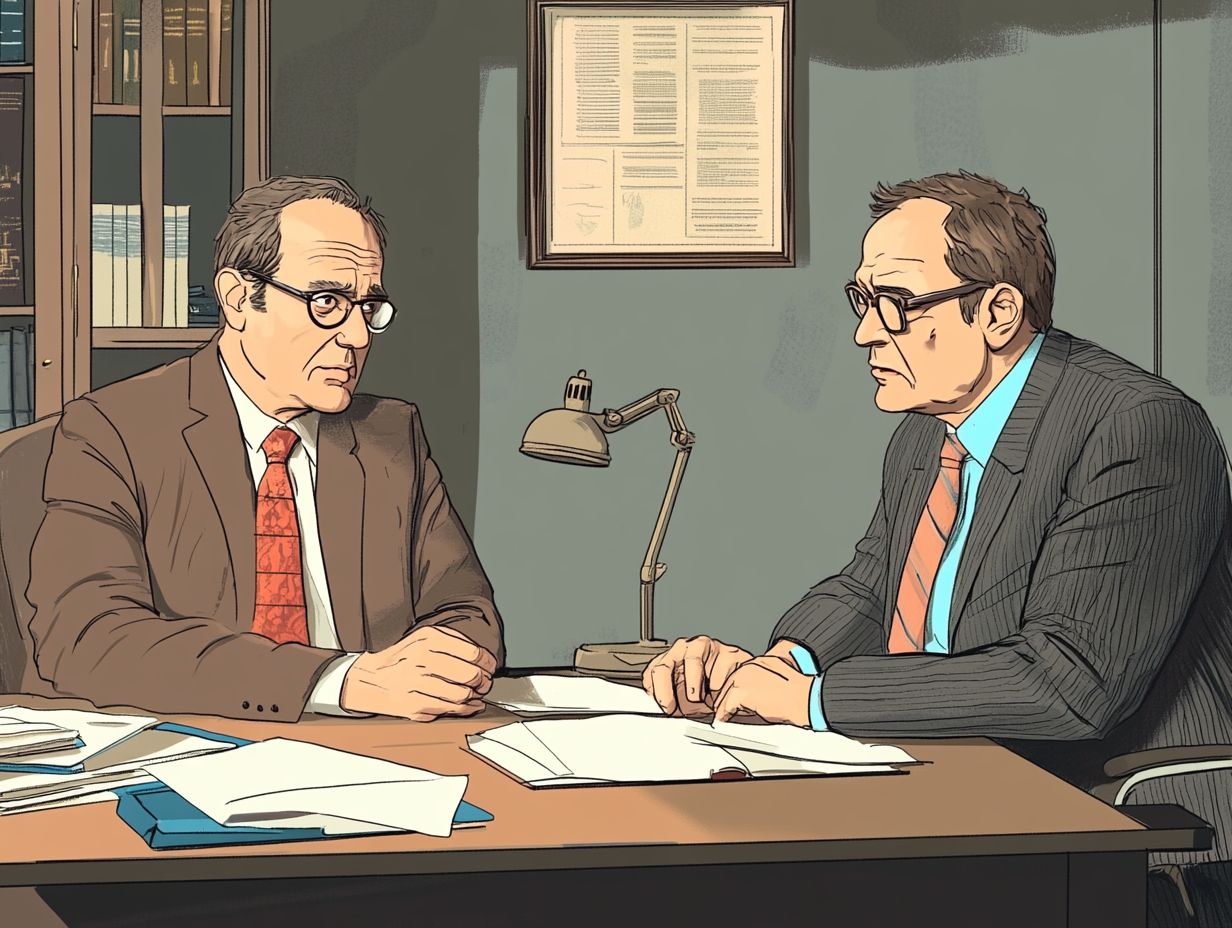
- Always be honest with your lawyer, even if it feels uncomfortable.
- Make paying your lawyer a priority to avoid complications.
- Trust your lawyer’s expertise; questioning their fees can harm your case.
1. “I Didn’t Do It”
When faced with legal challenges, it’s natural to instinctively declare, “I didn’t do it.” However, this reaction can complicate your relationship with your attorney. Such statements might lead to misunderstandings and miscommunications that could significantly affect the outcome of your case.
These declarations can create barriers to effective dialogue, often accompanied by assumptions that may not align with the facts your attorney knows. To foster a strong attorney-client relationship, clear communication and transparency are paramount. Ensure that you share all relevant details without leaving anything out.
It s common for clients to focus solely on exculpatory evidence while overlooking context or other information that might seem irrelevant but is actually crucial for understanding the case as a whole.
By taking the time to understand the legal process and actively engaging with your attorney, you set the stage for more effective representation and better outcomes.
2. “I’ll Pay You When I Win the Case”
The phrase, “I’ll pay you when I win the case,” frequently arises in personal injury claims. This highlights a common misconception about attorney fees and the intricacies of legal representation in pursuing compensation for injuries.
This sentiment has notable implications for you as a client and your attorney. Typically, legal payment structures work as a payment structure where the lawyer gets paid only if you win the case, meaning your attorney receives a percentage of the settlement once a favorable outcome is achieved.
Believing that payment is due only upon winning can foster unrealistic expectations and potentially strain your relationship with your attorney. It s essential to engage in upfront consultations to openly discuss various fee arrangements.
These conversations pave the way for clarity regarding costs, ensuring that both you and your attorney understand potential outcomes and financial responsibilities throughout the legal process.
3. “Can You Lower Your Fees?”
When you ask your lawyer, “Can you lower your fees?” it can spark significant discussions about the quality of legal representation and the dedication required for successful outcomes in complex cases.
This question often serves as a doorway to a deeper understanding of how pricing reflects the attorney’s expertise and the complexities of navigating the legal landscape.
It’s essential to realize that experienced lawyers typically come with a higher price tag, often justified by their proven track record in effectively managing similar legal challenges.
For anyone weighing their options, considering the potential benefits of hiring a seasoned professional against financial constraints can be enlightening. Recognizing that the lowest fee doesn t necessarily mean the best value enables clients to make informed decisions that align their legal support with their personal or business needs.
In conclusion, effective communication with your lawyer is vital for a successful outcome. Don’t miss the chance to build a strong attorney-client relationship that will help you navigate your legal challenges confidently.
4. “My Friend Said I Should Do This Instead”

Clients often seek legal advice from friends or social media. They might say, “My friend suggested I do this instead.” This can create confusion about effective legal strategies.
Relying on informal advice can lead to overlooking critical details that only a qualified attorney can address. Personal stories can give you an idea of others’ experiences. However, they often miss the specific details of your unique case.
Professional legal strategies are tailored to your specific needs and the intricacies of the law. Disregarding this distinction could ultimately hinder your legal outcomes and leave you vulnerable to potential pitfalls from wrong or incomplete information.
5. “Can We Keep This Between Us?”
When you ask your lawyer, “Can we keep this between us?” it s easy to overlook the importance of attorney-client privilege and the legal obligations of confidentiality.
This privilege is vital for building trust. It allows you to speak openly about your situation without fear of consequences. Confidentiality not only protects your personal information but also fosters honest dialogue essential for gathering accurate details and crafting effective strategies.
While some aspects, like your identity and the nature of the representation, remain confidential, specific exceptions apply, especially regarding ongoing or future criminal activity.
When you feel secure in your conversations, you set the stage for success! Upholding this confidentiality is crucial for achieving the best possible results.
Why Is It Important to Have a Good Relationship with Your Lawyer?
A solid relationship with your lawyer is essential. It fosters open communication, builds trust, and enhances collaboration critical elements for navigating the complexities of legal representation.
This relationship cultivates a shared understanding of goals, allowing you and your lawyer to work effectively toward common objectives. When you feel comfortable discussing your concerns, you’re more likely to provide relevant information.
Effective communication ensures important details aren t overlooked, paving the way for well-considered choices. Mutual respect creates an environment where both you and your lawyer value each other’s perspectives, leading to a stronger partnership.
Such commitment from both sides can significantly enhance your chances of a positive resolution, making it a fundamental aspect of successful legal interactions.
What Are the Consequences of Saying the Wrong Thing to Your Lawyer?
Saying the wrong thing to your lawyer can lead to serious consequences, impacting your legal representation and potentially resulting in unfavorable outcomes for your case.
If you downplay the severity of an incident or omit essential details, you might mislead your attorney into thinking they have a stronger argument than the reality supports.
This could leave them inadequately prepared for court, relying on information that is incomplete or inaccurate. On the flip side, exaggerating circumstances or providing inconsistent statements can introduce doubt into your attorney s mind.
Honesty and clarity in your communication are vital; they enable legal professionals to craft a reliable strategy tailored to your situation, minimizing the risk of negative outcomes stemming from misinformation.
How Can You Communicate Effectively with Your Lawyer?
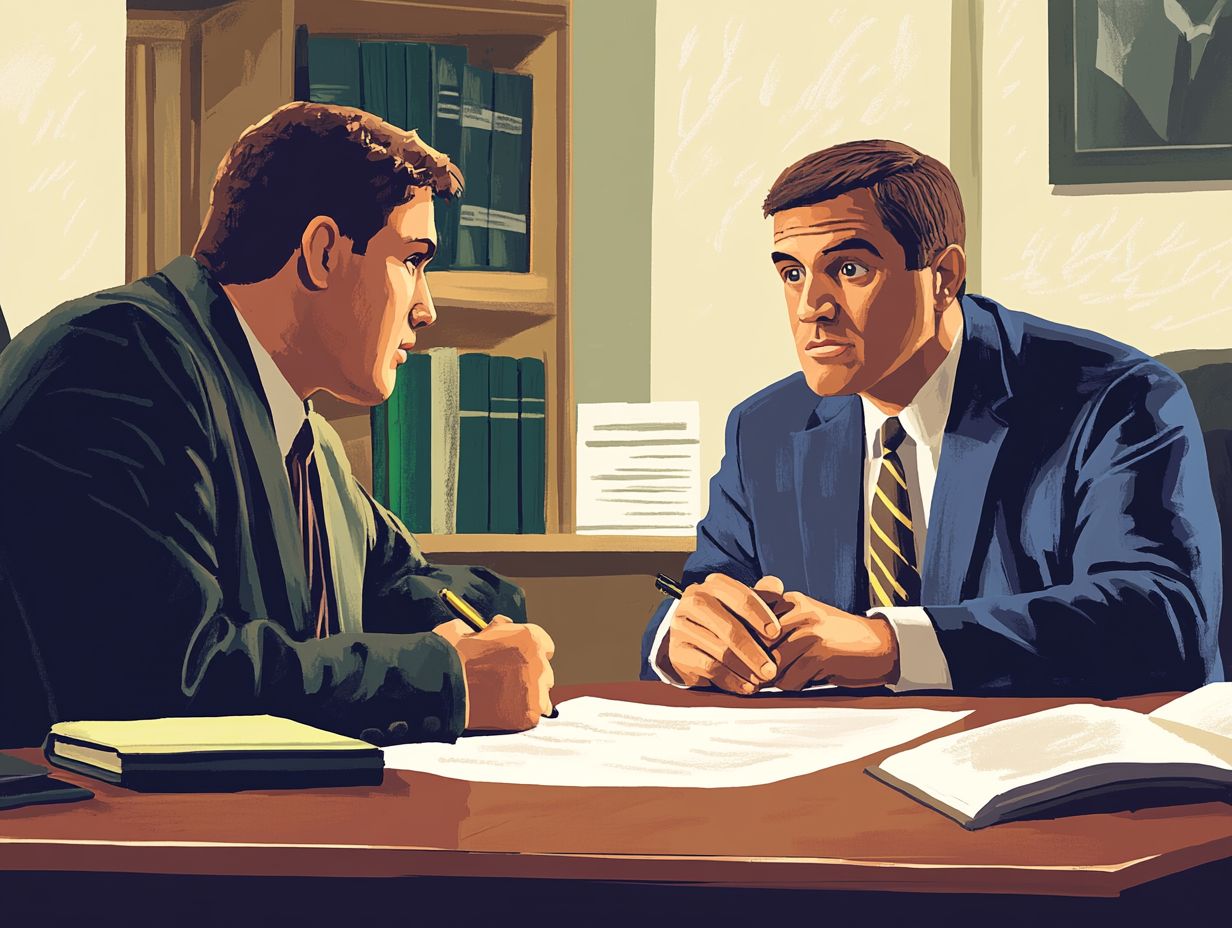
Effective communication with your lawyer is essential for successful representation. Employing clear strategies can elevate your attorney-client relationship and improve your case outcomes.
By preparing for meetings and organizing relevant documents beforehand, you create a more efficient dialogue. This minimizes misunderstandings and allows your lawyer to grasp the nuances of your case quickly.
Being candid about any concerns or questions fosters trust. This enables your lawyer to tailor their strategies effectively.
Think of your attorney as a partner in navigating the legal landscape. Open communication serves as the foundation of your collaborative efforts.
With these approaches, your chances of achieving favorable results increase significantly.
What Are Some Things You Should Say to Your Lawyer?
When working with a lawyer, it’s essential to clearly state your concerns and questions. This fosters an environment that encourages effective communication and ensures you receive tailored legal representation.
Key Topics to Discuss
To facilitate this dialogue, consider discussing key topics such as:
- The progress of your case,
- The strategies your lawyer intends to employ,
- The potential outcomes based on various scenarios.
Inquiring about timelines and foreseeable challenges helps clarify what to expect as your legal journey unfolds. This openness minimizes misunderstandings and enables informed decisions.
Engaging in regular discussions ensures that your attorney remains aligned with your goals and adapts their approach as needed. This ultimately enhances your chances of achieving a favorable resolution.
What Are Some Alternatives to Saying the Wrong Thing to Your Lawyer?
To avoid saying the wrong thing to your lawyer, consider alternatives that enhance communication and strengthen the attorney-client relationship. This leads to superior legal representation.
Fostering open dialogue boosts the effectiveness of your legal counsel. Providing comprehensive context and details about your case promotes transparency and helps your attorney understand your situation.
This thorough exchange of information highlights critical aspects that might otherwise go unnoticed. Cultivating a rapport through honest and constructive conversations allows your lawyer to advocate for you more effectively, resulting in a customized legal approach that meets your specific needs.
How Can You Find the Right Lawyer for Your Case?
Finding the right lawyer is crucial; start your search today! It requires diligent research and thoughtful consultations. Focus on key factors like expertise, experience, and communication style to ensure quality representation.
Start by verifying the attorney’s credentials. Confirm they possess the necessary licenses and have a strong educational background. Reviews from previous clients can offer invaluable insights into their effectiveness and professionalism.
Once you’ve gathered this information, conduct personal interviews with potential candidates. This clarifies their strategic approach and allows you to assess whether they genuinely understand your unique legal needs.
A lawyer who aligns with your goals and comprehensively understands your situation can significantly impact the quality of representation you receive.
Frequently Asked Questions

Explore common questions below to enhance your understanding and communication with your lawyer.
What are some things I should never say to my lawyer?
Some things you should never say to your lawyer include admitting guilt, lying or withholding important information, making guarantees, discussing your case with others, and criticizing their strategy.
Why should I never admit guilt to my lawyer?
Admitting guilt can seriously harm your case. Be honest, but don t confess to wrongdoing unless your lawyer tells you to.
Is it okay to lie or withhold information from my lawyer?
No, lying or hiding information from your lawyer is never acceptable. This can hurt your case and damage the trust between you.
Should I make guarantees to my lawyer about the outcome of my case?
Never make guarantees about your case’s outcome. The legal system is complex and unpredictable; trust your lawyer’s expertise to guide you.
Is it wise to discuss my case with others besides my lawyer?
You must avoid discussing your case with anyone other than your lawyer. Talking to family, friends, or even other lawyers can jeopardize your chances of success.
What should I do if I disagree with my lawyer’s strategy?
If you disagree with your lawyer’s strategy, express your concerns respectfully. Your lawyer has your best interests at heart, but seek a second opinion if you still have doubts.


